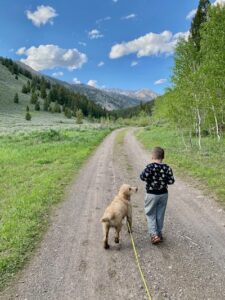By Fran Jewell

When we get into trouble with our dog, many people head to the Internet to get information. As the information superhighway, there is so much out there to gather!
What becomes difficult for most people if they search diligently is that they will find conflicting information. Some information will insist to never say “NO” to your dog, never raise your voice, never do this or do that, or that there is only one way to train.
A truly gifted dog-training instructor will have many “tools” in their toolbox. They will have experience in prescribing what will be effective for YOUR dog and for you. No two dogs are alike, nor are their owners. Everyone has different needs, and every dog learns differently.
Some dogs are extremely independent, as many of the terrier and livestock guardian groups of dogs are. Some dogs are very sensitive by nature, such as the hunting dogs, but at the same time, once their nose is engaged, they no longer have any emotional sensitivity. Many dogs have no interest in food. And, many dogs have more interest in chasing objects than in eating food, which can make food training almost impossible.
When you find information on the Internet, the information is always generalized. Unless you are face to face with an experienced instructor that has worked with hundreds of breeds and has experience with ALL training methodologies, picking training information off the Internet can be a hit-or-miss project. It may or may not fit for your dog and you. It is virtually impossible for anyone to prescribe what to do for a specific problem unless they know more about what your home life is like and what your individual dog is like. In short, if anyone that professes that one particular training technique is better than the other or is the ONLY way to train, they are not taking into consideration YOUR individual dog and YOUR circumstances.
I was reading a very well-known publication a few years ago that was giving advice about what to look for in a good puppy trainer. Without exception, the article said to never use a trainer that raised their voice. Now, seriously, have you ever seen one dog “raise their voice” at another dog in order to stop an unacceptable behavior? Of course, we all have. Older dogs may growl or bark firmly, even with intimidation, to tell a youngster her behavior is out of line. Is raising your voice always acceptable? No, but if it does let a puppy know they shouldn’t jump on the coffee table and grab a cheese knife that might cut them, is this a bad solution? It depends on the dog. Some puppies are very sensitive to a firm voice. Others could care less. If it is an effective consequence and does not abuse the dog, why don’t we use it?
The point is not whether the use of a firm or raised voice is right or wrong, it is that to make a flat statement that a raised voice should never be used comes from someone who doesn’t understand natural dog behavior.
Checking with the Internet is always a good source to give you ideas. But, when it comes to finding excellent solutions, a certified dog-training instructor is going to be able to give you the best information and solutions for YOU and YOUR individual dog. There are excellent certifying organizations out there. Look for organizations that do not require one method of training but rely on the professionalism of its members. One size does not fit all! The ones that are the most difficult to become members of are the ones I suggest. NADOI, the National Association of Dog Obedience Instructors, is the most difficult and requires many years of experience before someone can even apply. Check out ALL the certifying organizations and good luck!!
Fran Jewell is a dog behavior consultant, NADOI-certified instructor and vice president. She owns Positive Puppy Dog Training LLC and can be reached at (208) 721-7221.


